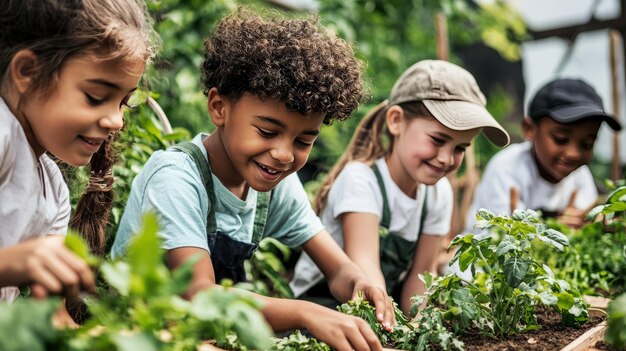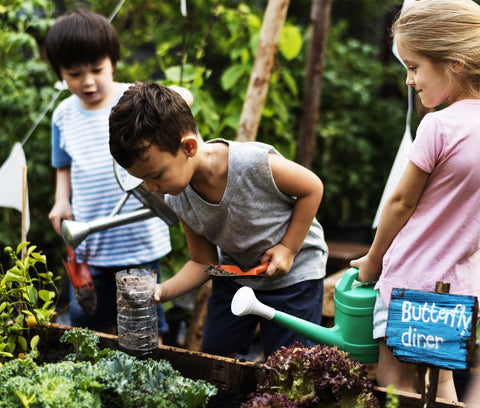– Nasreen Shakir & Ayesha Alvi
Allah (SWT) mentions in The Holy Quran in Surah Al-Anaam, Ayat 165:
“He is the One Who has placed you as successors on earth and elevated some of you in rank over others, so He may test you with what He has given you. Surely your Lord is swift in punishment, but He is certainly All-Forgiving, Most Merciful.”
The Holy Quran beautifully integrates the essence of nature within its verses. It is significant to note that nearly 78 verses mention the word “Gardens” and 48 verses mention the word “Trees” — as found in Surah Ar-Rahman, Surah An-Nahl, Surah Al-Anaam, and many others.
The Quran points towards two profound realities:
1. There are signs for those who reflect and ponder in the creations of Allah (SWT).
2. Everything in the universe created by Allah (SWT) has a purpose.
In this light, connecting children with plants is crucial for their emotional, physical, and spiritual development. This bond fosters a lifelong appreciation for the natural world and Allah’s (SWT) magnificent creation. Gardening, planting seeds, and nature exploration cultivate a deeper understanding of the natural environment while teaching invaluable life lessons.
Why We Must Create Awareness About Plantation Among Children
The benefits of engaging children in planting and nature-based activities are manifold:
● Helps reduce the level of the stress hormone cortisol.
● Certain bacteria in soil act as natural antidepressants.
● Direct exposure to dirt and plants boosts the immune system.
● Access to fresh and healthy fruits and vegetables ensures a nutritious diet.
● Acts as a natural form of exercise and health monitoring.
● Reduces the risk of dementia, stroke, and heart attacks.
● Enhances emotional health and overall well-being.
● Provides essential Vitamin D, along with the life-sustaining oxygen.

Takeaways for Children
● A child’s learning begins the moment they observe and track the gradual growth of a plant.
● Cultivates the characteristic of patience while awaiting results.
● Fosters deep curiosity and enthusiasm for the learning process.
● Instills a sense of responsibility and empathy towards plants and all living beings.
● Boosts critical thinking, problem-solving, and troubleshooting skills.
● Collective plantation drives promote a spirit of teamwork and cooperation.
● Enables children to comprehend how ecosystems are interconnected — how creations survive by sunlight, air, and water, and how these factors influence each other.
An ecological balance maintains dynamic equilibrium; even if population sizes fluctuate, the overall system remains constant.
Environmental and Spiritual Responsibility
Ecological sustainability preserves the biodiversity, composition, and processes of ecosystems. It is vital to promote environmental sustainability in our lives as all creations — birds, animals, insects, humans, and trees — are interdependent.
We are reminded to consume our resources justly and avoid excess, for we are accountable for our deeds, and all that is given to us is a test, as highlighted in the opening Quranic verse.
As Allah (SWT) commands:
“In order that ye may not transgress balance.” (Surah Ar-Rahman, Ayat 8)
Just as the Prophet Muhammad ﷺ was a mercy for all the worlds (Rahmat-ul-lil-A’alameen), we too are obligated to show mercy towards all of Allah’s creations.
The living examples set by the noble companions like Hazrat Uthman ibn Affan (RA) and Hazrat Abu Darda (RA) — who sacrificed their gardens and properties for the sake of Allah — reflect a sincere hope for reward in the hereafter. Their relationship with the environment stemmed not just from generosity, but from a deep love for the common Creator.
A Promise of Eternal Gardens
As Allah (SWT) promises:
“Allah has promised the believers, both men and women, Gardens under which rivers flow, to stay there forever, and splendid homes in the Gardens of Eternity.” (Quran 9:72)
As believers, we must actively work for the betterment of society and the Ummah — to please Allah (SWT) and attain eternal success. It is our moral duty and responsibility.
A Final Call to Action
We must also be mindful of the increasing rates of deforestation and environmental degradation. It is imperative for us to stop unnecessary tree cutting and actively engage in planting as many trees as possible. This noble effort will help restore ecological balance and make our surroundings a healthier, greener, and more beautiful place to live — InshaAllah.
The Prophet Muhammad ﷺ beautifully said:
“If the Resurrection were established upon one of you while he has in his hand a sapling, then let him plant it.”
(Sahih Al-Bukhari / Musnad Ahmad)
This Hadith emphasizes the timeless importance of caring for the earth, no matter the circumstances.
May Allah (SWT) make us among those who nurture His creation and become a source of mercy for the world. Ameen.




